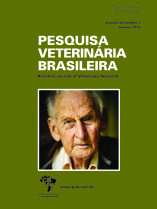 |
|
|
|
Year 2019 - Volume 39, Number 1
|

|
Current trends in bovine abortion in Argentina, 39(1):12-19
|
ABSTRACT.- Morrell E.L., Campero C.M., Cantón G.J., Odeón A.C., Moore D.P., Odriozola E., Paolicchi F. & Fiorentino M.A. 2019. Current trends in bovine abortion in Argentina. Pesquisa Veterinária Brasileira 39(1)12-19. Animal Health Group, Instituto Nacional de Tecnología Agropecuaria (INTA), Ruta 226 Km73, 5 (7620), Balcarce, Argentina. E-mail: morrell.eleonora@inta.gob.ar
Bovine abortion is an important cause of significant economic losses in beef and dairy herds. This syndrome is usually difficult to diagnose. The aim of this study was to characterize bovine abortion causes in Argentina by standard diagnosis procedures (histology, bacterial and viral isolation) and other diagnostic tests like direct fluorescent antibody test (DFAT), fetal serology, immunohistochemistry (IHC), and PCR, showing their specific advantages and limitations. Necropsies were performed in 150 aborted bovine fetuses submitted to the diagnostic laboratories of Instituto Nacional de Tecnología Agropecuaria (INTA) Balcarce, Argentina. Etiological diagnosis was confirmed in 78 fetuses (52% of the cases). Most causes of abortion were of infectious origin, being Neospora caninum (14.67%), Campylobacter fetus sp. (9.33%), Leptospira spp. (7.33%) and Brucella abortus (6.65%) the main microorganisms identified. Bovine viral diarrhea virus (BVDV) and bovine herpes virus (BHV) were diagnosed in 2 (1.33%) and 3 (2%) cases, respectively. This study showed a better characterization of bovine abortion compared with previous researches done on this topic. |
| |
|
|
| |
|
 |